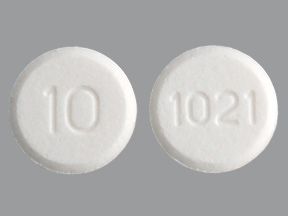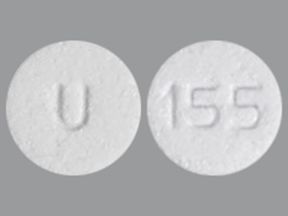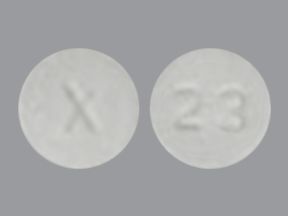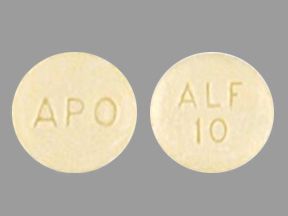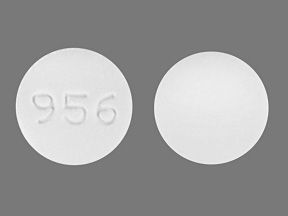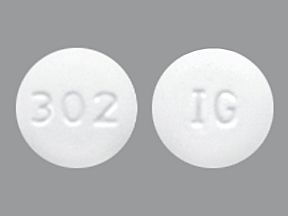Highlights for alfuzosin
- Alfuzosin is available as a generic drug and as a brand-name drug. Brand name: Uroxatral.
- Alfuzosin only comes as an extended-release oral tablet.
- Alfuzosin is used to treat benign prostatic hyperplasia (BPH) in adult men. It helps relax the muscles in your prostate and bladder, which can reduce BPH symptoms and improve your ability to urinate.
- Blood pressure warning: Alfuzosin may cause a sudden drop in your blood pressure when you change positions (such as standing up from sitting or lying down). It may also cause fainting. Avoid driving, using heavy machinery, or doing hazardous tasks until you know how it affects you. If you start feeling dizzy or lightheaded, lie down with your legs and feet up. Call your doctor if these effects don’t improve.
- Chest pain warning: Alfuzosin can cause serious side effects to your heart. If you experience new or worsening symptoms of sharp or squeezing chest pain (angina), stop taking alfuzosin and talk to your doctor or get immediate medical attention. Get medical attention if you have pain that moves to your arms, neck, or back, or if you have other symptoms, such as trouble breathing, sweating, dizziness, or nausea.
Alfuzosin is a prescription medication. It’s available as an oral extended-release tablet.
Alfuzosin is available as the brand-name drug Uroxatral. It’s also available in a generic version. Generic drugs usually cost less than brand-name drugs. In some cases, they may not be available in every strength or form as the brand-name version.
Why it’s used
Alfuzosin is used to treat benign prostatic hyperplasia (BPH) in adult men. This condition is also called enlarged prostate.
How it works
Alfuzosin belongs to a class of drugs called alpha-blockers. It works by helping to relax muscles in your prostate and bladder. This can reduce your BPH symptoms and improve your ability to urinate.
Alpha-blockers work on alpha receptors in your body. There are alpha receptors in many parts of your body, but this specific medication only acts on the receptors in your prostate and bladder.
Alfuzosin does not cause drowsiness, but it can cause other side effects.
More common side effects
The more common side effects that can occur with alfuzosin include:
- dizziness
- headache
- tiredness
Mild side effects may go away within a few days or a couple of weeks. Talk to your doctor or pharmacist if they’re more severe or don’t go away.
Serious side effects
Call your doctor right away if you have serious side effects. Call 911 if your symptoms feel life-threatening or if you think you’re having a medical emergency. Serious side effects and their symptoms can include the following:
- Sudden drop in blood pressure. Symptoms may include:
- dizziness or lightheadedness when changing position and standing
- an episode of passing out or unconsciousness
- Prolonged erection (priapism). This is an erection that can’t be relieved by having sex. Get medical help right away if this happens. If it isn’t treated, you may have permanent erection problems.
Disclaimer: Our goal is to provide you with the most relevant and current information. However, because drugs affect each person differently, we cannot guarantee that this information includes all possible side effects. This information is not a substitute for medical advice. Always discuss possible side effects with a healthcare provider who knows your medical history.
Alfuzosin oral tablet can interact with other medications, vitamins, or herbs you may be taking. An interaction is when a substance changes the way a drug works. This can be harmful or prevent the drug from working well.
To help avoid interactions, your doctor should manage all of your medications carefully. Be sure to tell your doctor about all medications, vitamins, or herbs you’re taking. To find out how this drug might interact with something else you’re taking, talk to your doctor or pharmacist.
Examples of drugs that can cause interactions with alfuzosin are listed below.
BPH and blood pressure drugs
Avoid using alfuzosin with other alpha-blockers. Combining the drugs may increase your risk of side effects since the medications work similarly. Examples of other alpha-blockers include:
Blood pressure drugs
Using blood pressure medications and alfuzosin together may increase your risk of low blood pressure, a sudden drop in your blood pressure when standing, or fainting. Examples of these drugs include:
- aldosterone antagonists, such as:
- spironolactone
- eplerenone
- angiotensin-converting enzyme (ACE) inhibitors, such as:
- benazepril
- lisinopril
- enalapril
- fosinopril
- angiotensin receptor blockers (ARBs), such as:
- losartan
- candesartan
- olmesartan
- telmisartan
- valsartan
- beta-blockers, such as:
- atenolol
- bisoprolol
- metoprolol
- propranolol
- calcium channel blockers, such as:
- amlodipine
- nifedipine
- nicardipine
- diltiazem
- verapamil
- centrally acting adrenergic agents, such as:
- clonidine
- guanfacine
- methyldopa
- direct renin inhibitors, such as aliskiren
- diuretics, such as:
- amiloride
- chlorthalidone
- furosemide
- metolazone
- vasodilators, such as:
- hydralazine
- minoxidil
- nitrates, such as:
- isosorbide mononitrate
- isosorbide dinitrate
- nitroglycerin transdermal patch
Erectile dysfunction and pulmonary hypertension drugs
These include phosphodiesterase-5 (PDE-5) inhibitors. These drugs are used to treat erectile dysfunction and sometimes high blood pressure. Using them with alfuzosin may lead to very low blood pressure.
Examples of these drugs include:
- avanafil
- sildenafil
- tadalafil
- vardenafil
Drugs that inhibit CYP3A4 enzyme
The CYP3A4 enzyme processes alfuzosin in your liver. Medications that block this liver enzyme may cause the levels of alfuzosin to increase in your body. This may put you at risk for more side effects. Alfuzosin shouldn’t be used with strong inhibitors of this enzyme.
A few examples of these drugs include:
- ketoconazole
- itraconazole
- ritonavir
Disclaimer: Our goal is to provide you with the most relevant and current information. However, because drugs interact differently in each person, we cannot guarantee that this information includes all possible interactions. This information is not a substitute for medical advice. Always speak with your healthcare provider about possible interactions with all prescription drugs, vitamins, herbs and supplements, and over-the-counter drugs that you are taking.
This drug comes with several warnings.
Allergy warning
Alfuzosin can cause a severe allergic reaction. Symptoms may include:
- trouble breathing
- swelling of your throat, tongue, face, or lips
- hives
- itching skin or rash
- peeling or blistering skin
- fever
- chest tightness
If you develop these symptoms, call 911 or go to the nearest emergency room.
Don’t take this drug again if you’ve ever had an allergic reaction to it. Taking it again could be fatal (cause death).
Warnings for people with certain health conditions
For people with liver problems: Don’t take alfuzosin if you have moderate or severe liver problems. If your liver isn’t working well, more of the drug may stay in your body. This increases your risk of side effects.
For people with kidney problems: Use this medication with caution if you have severe kidney problems. If your kidneys aren’t working well, more of the drug may stay in your body. This increases your risk of side effects.
For people with rhythm heart problems: Use this drug with caution if you have a heart condition known as QT prolongation or if you’re taking medications that lengthen QT interval. It isn’t known how alfuzosin will affect your QT interval.
For people with prostate cancer: Benign prostatic hyperplasia and prostate cancer cause similar symptoms, but prostate cancer is treated with different medications. Your doctor will examine your prostate gland and do a blood test called a prostate specific antigen (PSA) test to check for prostate cancer before starting you on alfuzosin.
For people having cataract surgery: If you’re having cataract surgery and are taking alfuzosin (or have a history of taking it), you may be at increased risk for having a complication during the surgery known as intraoperative floppy iris syndrome (IFIS). Let your eye doctor know if you’re taking this medication. Your eye doctor may need to change the technique for your eye surgery to decrease your risk for IFIS. There doesn’t appear to be any benefit of stopping alfuzosin before your eye surgery.
Warnings for other groups
For pregnant women: Alfuzosin is used to treat benign prostatic hyperplasia in men only. Women shouldn’t use this drug, and there are no studies of alfuzosin in pregnant women.
For women who are breastfeeding: Alfuzosin is used to treat benign prostatic hyperplasia in men only. Women shouldn’t use this drug.
For seniors: Alfuzosin is safe and effective for adults aged 65 years or older. However, seniors may not be able to clear this drug well from their bodies. This can lead to more of the drug staying in your body, putting you at greater risk of side effects.
For children: Alfuzosin should not be used in children.
All possible dosages and drug forms may not be included here. Your dosage, drug form, and how often you take the drug will depend on:
- your age
- the condition being treated
- how severe your condition is
- other medical conditions you have
- how you react to the first dose
Forms and strengths
Generic: Alfuzosin
- Form: Oral extended-release tablet
- Strength: 10 mg
Prescription: Uroxatral
- Form: Oral extended-release tablet
- Strength: 10 mg
Dosage for benign prostatic hyperplasia (BPH)
Adult dosage (ages 18 years and older)
The recommended dose is 10 mg taken once per day.
Child dosage (ages 0–17 years)
This drug should not be used in children.
Disclaimer: Our goal is to provide you with the most relevant and current information. However, because drugs affect each person differently, we cannot guarantee that this list includes all possible dosages. This information is not a substitute for medical advice. Always speak with your doctor or pharmacist about dosages that are right for you.
Alfuzosin is used for long-term treatment. It comes with risks if you don’t take it as prescribed.
If you don’t take it at all or stop taking it: If don’t take or stop taking alfuzosin, you may have increased symptoms of BPH, such as difficulty starting to urinate, straining while trying to urinate, frequent urges to urinate, pain during urination, and dribbling after urination. It’s important to continue taking your medication as directed by your doctor, even if you feel better. Doing so will provide the best chance of managing BPH and improving your quality of life.
If you take too much: Taking too much alfuzosin may lead to:
- low blood pressure, with symptoms including dizziness, lightheadedness, and fainting
- other problems with your heart
- shock
If you think you’ve taken too much, call your doctor or get emergency medical help right away.
What to do if you miss a dose: You should take this medication once a day. If you miss a dose, take it as soon as you can. If it’s close to time for your next dose, skip the missed dose.
Don’t make up the missed dose by taking two doses the next day. This could cause dangerous side effects.
How to tell if the drug is working: You may be able to tell this drug is working if your symptoms of BPH improve.
Keep these considerations in mind if your doctor prescribes alfuzosin for you.
General
- Take this drug with food at the same time each day. If you don’t take this medication with food, it won’t be fully absorbed by your body, and it may not work as well.
- Don’t crush or chew these tablets.
Storage
- Store in temperatures between 59°F and 86°F (15°C and 30°C).
- Protect this medication from light and moisture.
Refills
A prescription for this medication is refillable. You should not need a new prescription for this medication to be refilled. Your doctor will write the number of refills authorized on your prescription.
Travel
When traveling with your medication:
- Always carry your medication with you. When flying, never put it into a checked bag. Keep it in your carry-on bag.
- Don’t worry about airport X-ray machines. They can’t hurt your medication.
- You may need to show airport staff the pharmacy label for your medication. Always carry the original prescription-labeled box with you.
- Don’t put this medication in your car’s glove compartment or leave it in the car. Be sure to avoid doing this when the weather is very hot or very cold.
Availability
Not every pharmacy stocks this drug. When filling your prescription, be sure to call ahead to make sure they carry it.
Prior authorization
Many insurance companies require a prior authorization for this drug. This means your doctor will need to get approval from your insurance company before your insurance company will pay for the prescription.
There are other drugs available to treat your condition. Some may be more suitable for you than others. Talk to your doctor about possible alternatives.
Disclaimer: Healthline has made every effort to make certain that all information is factually correct, comprehensive, and up-to-date. However, this article should not be used as a substitute for the knowledge and expertise of a licensed healthcare professional. You should always consult your doctor or other healthcare professional before taking any medication. The drug information contained herein is subject to change and is not intended to cover all possible uses, directions, precautions, warnings, drug interactions, allergic reactions, or adverse effects. The absence of warnings or other information for a given drug does not indicate that the drug or drug combination is safe, effective, or appropriate for all patients or all specific uses.

